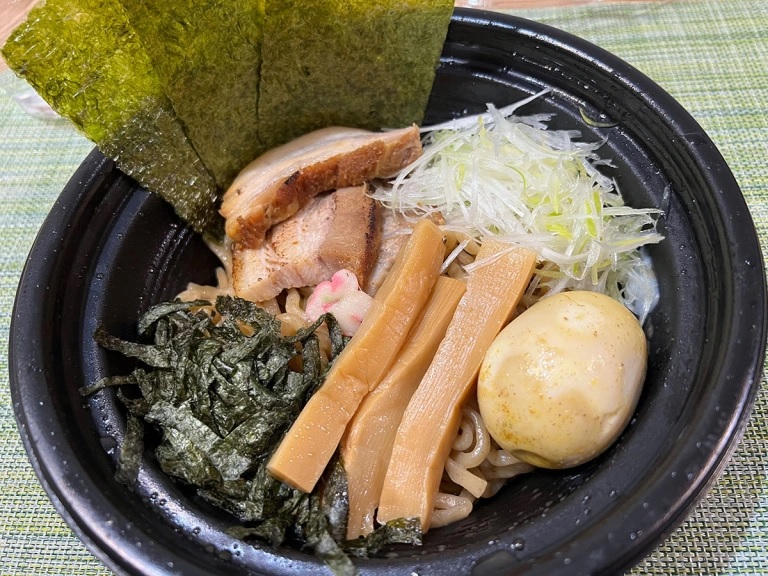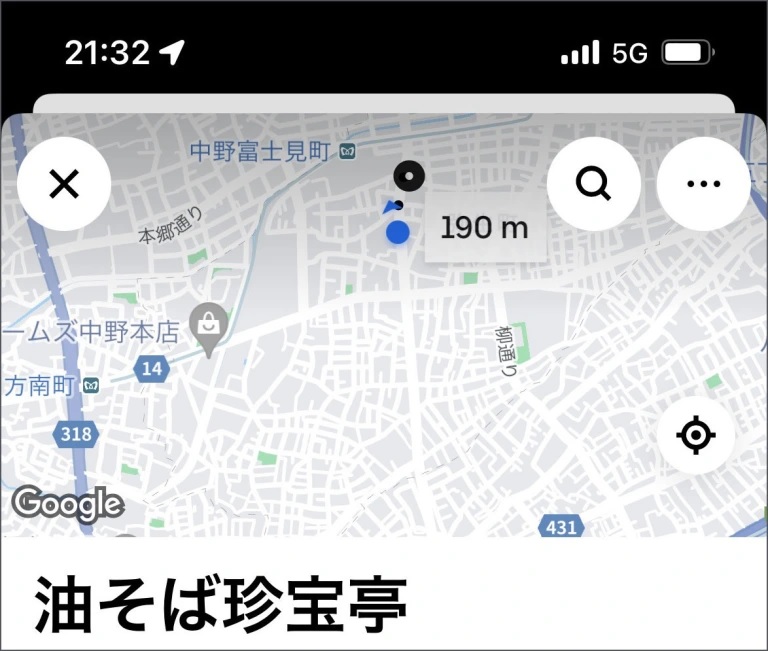
Hey, Tokyo police officer, can you give us directions to the Chinpo restaurant?
A few weeks ago, our Japanese-language reporter Yuichiro Wasai ordered some ramen through Uber Eats from a restaurant in Tokyo’s Nakano Ward. It was good, so the next time he found himself craving ramen after work, he decided to get it from that same restaurant again.
▼ The ramen Yuichiro was craving

Looking at the restaurant’s listing, though, Yuichiro noticed that in addition to delivery, they also offer takeout, i.e. you can come and pick up the food yourself. While it’d be a long walk from Yuichiro’s apartment, the restaurant was within doable biking distance, so after he got home from the office he dropped off his work bag, hopped on his bike and headed out…and almost immediately he ran into trouble.
Since Yuichiro was on his bike, he had to stop pedaling every time wanted to check the map, and he had to check the map a ton of times. That’s because when he pulled up the Uber Eats map for the restaurant’s listing, it looked like this.

That’s two street names, two station names, and not a single other landmark to navigate by over a journey of dozens of blocks, with the streets in the confusing labyrinthine array common to Japanese suburbs. So while Yuichiro knew he was in the right general area, he wound up going around and around in circles trying to find the restaurant. Among the building he kept riding past by was a police box, and sure enough, after the officer on duty saw him pass by a few times, he flagged Yuichiro down and said:
“You there, excuse me, can you stop for a moment?”
Yuichiro’s heart sank. It’s not uncommon for the police in Japan to stop people who appear to be wandering or loitering around and ask to check their ID and/or the contents of their bag. Thankfully, you’re not going to get hauled off to prison on trumped up charges, but it is a time-consuming pain, especially since the stops are sometimes seemingly performed primarily as practice for new recruits to the police force.
Still, Yuichiro figured the smoothest resolution would be to comply with the request, so he stopped his bike and the officer asked him a question.
Officer: “Where are you headed? Are you on your way home?”
Yuichiro: “No, I’m going to buy dinner.”
Officer: “So, at the supermarket?”
Yuichiro: “No, I’m going to get takeout at a restaurant called-“
And that’s where things got awkward. The name of the restaurant Yuichiro was looking for is written in kanji characters as 珍宝亭. That last kanji, 亭, pronounced “tei,” is common at the end of restaurant names in Japan. It originally refers to a fancy house, often with a garden, so putting it at the end of your establishment’s name adds a sort of rustic elegance to it. Meanwhile, the first two kanji, 珍宝, mean “rare treasure.”
Unfortunately for Yuichiro, 珍宝亭 is pronounced Chinpo-tei, and the almost identical-sounding chinpou is a Japanese slang word for “penis.” Making things worse is that 珍宝/chinpo isn’t a very common word in conversational Japanese. So as Yuichiro told the police officer he was looking for Chinpo-tei, he was fully aware that instead of the classy-sounding “Rare Treasure Dining Room,” it probably sounded like he was saying he was looking for “Chez Dick.”
And just as he’d feared, as soon as he said “I’m looking for Chinpo-tei,” the atmosphere deepened to a new level of awkwardness. Hoping to plug the uncomfortable silence with an overly thorough explanation, Yuichiro stammered “Chinpo-tei is a ramen restaurant. A while back, I ordered food from them on Uber Eats, and it was good. It looks like they allow walk-in takeout orders too, so I’m trying to find the place. It’s supposed to be around here somewhere, but it’s hard to tell from the map. Ah, you don’t happen to know where it is, do you?”
For added emphasis, Yuichiro showed the officer the map on his phone, but he still replied with:
“Yeah, looking at the map, it does look like it’s somewhere around here. But first of all, can I confirm the registration number for your bike?”
Yuichiro’s explanation of Chinpo-tei seemed to have been enough to prevent the officer getting the false impression that he was headed to some sort of culinary-themed sex club. He was stuck waiting around for a few minutes while the officer checked the bike registration records, which showed that yes, Yuichiro was indeed the owner of the bike he was on.
And yet, even after the officer thanked him for his cooperation, Yuichiro could still feel his eyes on him as he started pedaling and resumed his hunt for Chinpo-tei. So to get the officer’s gaze off his back, he took his best guess at which building in his immediate line of sight might be the one marked on the map and went inside.
It turned out to be an Indian restaurant. Looking around, Yuichiro didn’t see the kanji for Chinpo-tei written anywhere either. “Table for 1?” said an employee as they approached him.
But Yuichiro didn’t want a table, nor did he want Indian food. Maybe, just maybe, this was one of those places where the restaurant itself operates under one name, but it’s registered with a different name and menu on food delivery apps, preparing the takeout/delivery meals in the same kitchen as the other items for their in-restaurant customers. On the other hand, if the employee said that wasn’t the case, and this wasn’t Chinpo-tei, Yuichiro could just say he’d made a mistake and be on his way.
Yuichiro: “I’d like to order takeout, but is this the restaurant registered on Uber Eats as Chinpo-tei?”
Employee: “Chi-, Chi-…what?!?”
Yuichiro: “…Chinpo-tei.”
Employee: “I’m not sure. Let me go get the manager.”
“Agggggghhh!” thought Yuichiro, as his plan to create a excuse for a quick getaway backfired. But things would all work out OK if the manager said that this Indian restaurant really was also the ramen restaurant Chinpo-tei, so when the employee returned with the boss Yuichiro asked if they also operated on Uber Eats as Chinpo-tei, to which the manager, without hesitation, replied:
“Now, we don’t.”
So now Yuichiro, who’d started the evening with the simple plan to go pick up some ramen, had entered into his third awkward conversation of the night. Having now taken up two of the restaurant workers’ time, he figured he really should buy something, and so he gave up on getting ramen that night and got a to-go order of curry instead.
After some more fiddling with the Uber Eats map on a later day, Yuichiro learned that if you place your takeout order through the app itself, it then fills in more details on the map for you. Armed with that information, Yuichiro was finally able to find Chinpo-tei and get the takeout ramen he’d wanted in the first place, but on the plus side, he now knows a place to get ramen and a place to get curry in his neighborhood.
Photos ©Soranews24
● Want to hear about SoraNews24’s latest articles as soon as they’re published? Follow us on Facebook and Twitter!
